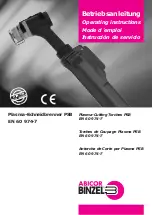
7
PORTA
GANTRY
RAPIDE
Attach the hoist to the lifting point on the
trolley only, making sure it is attached in a way
that does not expose the user to danger by
the hoist, chain or load.
Only raise and lower loads when castor brakes
are engaged.
Do not allow the load to swing.
To avoid side pull, lowering and lifting should
only be carried out when the load chain forms
a straight and vertical line between the load
and lifting attachment point on the trolley. If a
vertical lift is not possible you must ensure that
the load is within the footprint of the Gantry
A-Frames (refer to figure A).
We recommend the use of load-sensing or
overload protection devices on all lifts.
The product should not be moved under load
except when a competent person or authority
has approved a risk assessment and method
statement.
The risk assessment and method statement
must take into account any factors that might
apply additional loading to the system during
lifting operations.
Take care when transporting and storing the
system to avoid damage.
To ensure stability of the structure, the
operating span of the beam must be equal
to or greater than the distance between the
castors on the A-Frame.
The equipment should not be used outside
of its limitations, or for any purpose other than
that for which it is intended.
.
Do not lift or transport loads while personnel
are in the danger zone.
Do not allow personnel to pass under a
suspended load.
Never leave a suspended load unattended.
Do not start moving the load along the beam
until you have checked that it has been
attached correctly.
When moving a loaded trolley along
the beam, move the load steadily and in
a controlled manner and avoid sudden
movements.
Don’t allow the load to hit the system frame.
When winching, only use one winch with each
sheave and make sure they never cross paths
with each other.
Be aware of any adverse weather conditions
such as strong or gusty winds which could
impose additional horizontal loads and affect
the stability of the structure. Stop using if
weather is impacting on lifting, and either
disassemble the gantry or tie it to a rigid
structure to ensure it can’t overturn.
Be aware of hazards when setting up/folding
down, such as trapping fingers in rotating
parts.
Note: The Rapide Tall Systems are fitted with
trolley stops on the beam (see below). This
is a safety feature and must always be in
place before use. If beam length adjustment
is required, stops must be repositioned
accordingly.
Correct Operation
A
Fall Protection Applications
Use as a Fall Protection Anchor
This section must not be read in isolation from
all other sections of this manual. Read the whole
manual before using this product.
Fall arrest:
This product is tested and conforms
to the requirements of EN795:2012 Personal Fall
Protection Equipment – Anchor Devices for single
or multiple users and CEN TS 16415:2013 subject to
the configuration of the product being used. When
being used for fall arrest, the operator must use a
body harness and a shock absorber that complies
with the relevant national standards and regulations
and that limits the maximum allowed force (MAF)
to 6kN.
Users may be attached to the system via a travelling
trolley (which may also be locked in place) or
via a fall protection device mounted to the side
trap plate of the A-frame, which is subsequently
deviated through a pulley and sheave carrier. Only
one person should be attached to each trolley in
accordance with the notified working load limit
(WLL).
Each personnel lift must be properly planned,
and all weights clearly known along with a clear
understanding of the WLL and constraints of all
personal fall arrest system components.
The capabilities stated in the table below apply to
standard range systems only. If unsure about your
system consult serial labels, information filled in on
page 35
or consult your supplier.
Custom versions of the system are available
tailored to specific lifting needs. These versions
are designated with a ‘C’ at the end the product
number on the serial label attached to each A-frame
and beam.
Additional Notes for Correct Operation
The anchorage must always be above the users
head to prevent dangerous free falls.
Always carry out pre-use checks before using
this equipment. It is advised to use a buddy
system and inspection must be by a competent
person.
The fall arrest device must only be attached to
the lifting point on the trolley or the designated
location on the cheek plate or upright (see
product images and set up instructions).
Only use the product for fall arrest applications
when the castor brakes are engaged.
To ensure stability of the structure, the operating
span of the beam must be equal to or greater
than the distance between the castors on the
A-Frames.
Always consider the potential effects of sharp
edges, chemical reagents, electrical conductivity,
cutting, abrasion, climatic exposure on all
components of the fall protection system,
and the effect of offset forces as a result of
pendulum falls.
Ensure the structure on which the product is
mounted is horizontal. If necessary, adjust the
products feet to achieve a level operating
structure.
If the product has been subjected to a fall arrest
or impact force it must be immediately removed
from service.
The substrate of the structure on which the
product is placed must be able to sustain the
loads specified for the device in all orientations
permitted, including a safety factor of at least 2.
Never exceed the number of allowable users.
Model
PGRS20
PGRS23, PGRM20,
PGRM23
PGRS40, PGRM40,
PGRT20, PGRT23,
PGRT40
Application
Capacity (Persons) Capacity (Persons)
Capacity (Persons)
Fall Arrest*
3
2
1
Model
PGR1TS20, PGR1TS30, PGR1TS40, PGR1TM20,
PGR1TM30, PGR1TM40, PGR1TT20, PGR1TT30,
PGR1TT40
Application
Capacity (Persons)
Fall Arrest*
3
* Only Applicable to the product being used in accordance with
PD CEN/TS 16415:2013 recommendations for anchor devices for
use by more than one person. When being used in accordance
with EN795:2012, the structure shall be limited to a maximum of
one user in fall arrest.





































